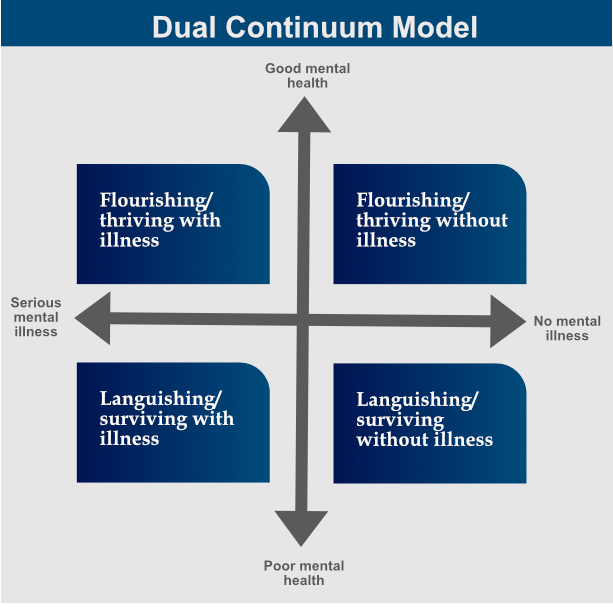The Public Health Agency of Canada (2014) defines mental health as “the capacity of each and all of us to feel, think, and act in ways that enhance our ability to enjoy life and deal with the challenges we face. It is a positive sense of emotional and spiritual wellbeing that respects the importance of culture, equity, social justice, interconnections and personal dignity.”
Just like we all have physical health, we all have mental health. Mental health is not permanent or fixed. Just like with physical health, a person can experience changes in their mental health from day to day.
A contemporary model of mental health (Figure 2) depicts mental health as existing on a continuum that includes both positive and negative aspects.

Figure 2 : Corey Keyes' Dual Continuum Model
The continuum model of mental health allows us to see that mental health is important for everyone.
It shows that positive or negative mental health is not defined by the presence or absence of a mental health diagnosis. Rather, both positive mental health (“flourishing”) and negative mental health (“languishing”) can happen for individuals with or without a diagnosis.
Mental health diagnoses, such as depression and anxiety, do create additional challenges for an individual’s mental health. These individuals are more likely to experience instances of negative mental health, and may require additional support to maintain positive mental health.
Positive mental health can range from varying levels of positive emotions, life satisfaction, and overall psychological wellbeing.
Negative mental health can, but does not always, mean distress or mental health struggles. It can also mean not experiencing an overall positive state of mental health, which can include experiencing low occurrences of positive emotions, life satisfaction and overall levels of psychosocial well-being. It is where individuals are just surviving rather than thriving.
One’s experience of mental health is not ‘fixed’. It will naturally ebb and flow as we encounter life stressors and difficulties, but also life successes and joys.
Reference: Keyes, C. L. M. (2002). The mental health continuum: From languishing to flourishing in life. Journal of Health and Social Behavior, 43(2), 207-222.
Public Health Agency of Canada. (2014). Mental health promotion. https://www.canada.ca/en/public-health/services/health-promotion/mental-health/mental-health-promotion.html